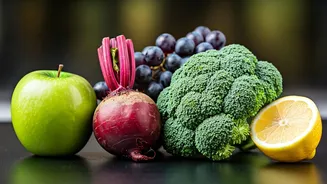Introduction: Liver's Vital Role
The liver is a powerhouse, performing numerous essential functions within our bodies. It plays a critical role in detoxification, metabolizing nutrients,
and producing vital substances. A healthy liver is essential for overall well-being, influencing everything from energy levels to the efficient removal of waste. Maintaining liver health through diet and lifestyle choices is therefore of utmost importance. The foods we consume directly impact the liver's ability to function effectively, making dietary choices a cornerstone of liver care. Understanding which fruits and vegetables can support the liver allows you to make informed decisions for your health.
Broccoli: The Cruciferous Champion
Broccoli, a cruciferous vegetable, is packed with beneficial compounds that support liver health. These compounds, such as glucosinolates, aid in the detoxification process by helping the liver eliminate harmful substances. Regular consumption of broccoli can help protect the liver from damage and improve its ability to function optimally. It also contains fiber, supporting overall digestive health, which in turn benefits the liver. Incorporating broccoli into your diet through steamed dishes, salads, or stir-fries provides a simple yet effective way to support your liver's health.
Berries: Antioxidant Powerhouses
Berries, including blueberries, strawberries, and raspberries, are loaded with antioxidants. These antioxidants fight free radicals and reduce oxidative stress, both of which can harm liver cells. The antioxidants present in berries protect the liver from damage and contribute to its ability to regenerate and function efficiently. Eating a variety of berries offers a flavorful and effective means of supporting your liver. They can be enjoyed fresh, added to smoothies, or included in desserts, offering versatility in your diet while providing significant health benefits.
Leafy Greens: Nutritional Boost
Leafy greens like spinach and lettuce are rich sources of vitamins, minerals, and antioxidants essential for liver health. These nutrients support detoxification and help the liver process toxins. Leafy greens also provide fiber, which aids in digestion and helps regulate blood sugar levels, indirectly benefiting liver function. Consuming leafy greens as part of your daily meals, in salads or as side dishes, provides crucial support for your liver, making them an excellent addition to a liver-friendly diet. Their versatility allows for easy incorporation into numerous recipes.
Carrots: Beta-Carotene Benefits
Carrots are rich in beta-carotene, a compound that the body converts into vitamin A. Vitamin A is crucial for liver health, helping to protect against liver damage and supporting its overall function. Carrots also provide fiber, which aids in digestion and reduces the burden on the liver by helping to eliminate waste more efficiently. Including carrots in your diet, whether raw, cooked, or juiced, provides a simple yet powerful way to support liver health. They are a versatile food that can easily be incorporated into various meals and snacks.
Beans and Legumes: Protein Power
Beans and legumes offer a good source of protein and fiber, both of which are beneficial for liver health. Adequate protein intake supports the liver's ability to repair and regenerate cells. Fiber aids in digestion and helps remove toxins, reducing the workload on the liver. The fiber in beans and legumes helps in controlling blood sugar levels, further contributing to liver well-being. Incorporating beans and legumes into your diet provides essential nutrients that support the liver's health and enhance its ability to function correctly. They can be included in various dishes, from soups to salads.













